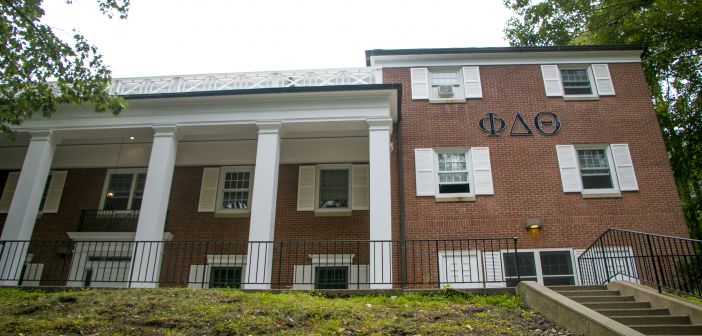The term Gryphon in Greek Mythology is a winged beast: half eagle and half lion. They were considered keepers of the gold and at Lehigh, students are considered “the gold.”
As university employees and peer advisors, Gryphons provide students in residence halls with support in terms of educational and social opportunities, health and safety.
But for individuals living in Greek houses, these governing students, and the resources they bring, are not available.
Allison Gulati, the associate dean of students and director of strategic initiatives, said fraternities and sororities provide type of living community that differs from traditional residential housing. Rather than having Gryphons, Greek organizations have a self-governance structure that includes a variety of positions in which students advise and provide educational opportunities for their peers.
“Students who choose to join a fraternity or sorority are joining a national organization that also has its own set of values, rules, expectations and accountability systems,” Gulati said.
According to Gulati, students in these organizations are responsible for self-governing their living experience. This includes cleaning their house and dishes, managing their meals and meal plans, handling daily upkeep and long-term physical issues/renovations, providing educational, social and professional opportunities for their members and overseeing all of the finances needed to do all of these other things.
One of the roles within Greek organizations that has some similar responsibilities as a Gryphon is the house manager. According to Katy Kresge, associate director of Residential Services, each house manager is specifically responsible for managing the physical facility in which a fraternity or sorority community lives. They are advised by the Office of Residential Services to ensure that the infrastructure of the house best supports the needs of students.
The duties of a house manager include basic oversight of the chapter facility including, but not limited to, ensuring fire and life safety policies are communicated and followed, house cleanliness is appropriate, occupancy is met and house rooming lists are accurate.
“House managers go through an in-depth training at the beginning of their term,” Kresge said. “During the academic year, monthly group and one-on-one meetings are held with Residential Services.”
Jun-Lucas Pritsker, ’18, house manager of Phi Delta Theta, said the most challenging aspect is getting his brothers to understand and follow the many rules set forth by the university regarding living in the house.
“As a house manager and a member of our executive council, we’ve created rules and guidelines to prevent future problems from arising in the house while still making sure we can have fun,” Pritsker wrote in an email. “As a brotherhood, a great deal of work has gone into proving that we deserve this house.
“The brothers understand this and we rely on our strong mutual respect for each other to maintain the house in such a way that we can call it our home for the foreseeable future.”
It is important to note that house managers are only one of many roles within a chapter. There are many other positions within the chapters that make up the self-governing structure and contribute to the overall experience of members who live in the house. As a result, house managers are not responsible for scheduling educational programs for the house or for individually meeting with or advising their peers like Gryphons do.
According to Gulati students who live in facilities without Gryphons receive training related to many of the topics that the residential assistants receive training for as well. Risk managers and social chairs receive training related to alcohol and drug issues, emergency response protocol and social host training. Chapter presidents and membership educators receive training related to programmatic responsibilities, chapter management and liability. Every chapter member is required to do additional alcohol education, gender violence education and harassment education.
In the past, incidents such as sexual assault or hazing have taken place within both residential and non-residential settings. The presence of trained leaders, whether a Gryphon or a leader of a Greek organization, does not guarantee that some of these incidents will not happen.
According to Ashley Baudouin, interim director of the Office of Fraternity and Sorority Affairs, it is Lehigh’s responsibility to make sure the right individuals in each of those settings has the training and access to resources that makes sense within their areas.
“With fraternity and sorority membership comes a significant amount of responsibility and accountability to cultivate a meaningful experience for members, and I feel strongly about providing our students with the opportunity to do just that given appropriate resources and support,” Baudouin said. “Regardless, this is a conversation we’ll continue to explore.”






Comment policy
Comments posted to The Brown and White website are reviewed by a moderator before being approved. Incendiary speech or harassing language, including comments targeted at individuals, may be deemed unacceptable and not published. Spam and other soliciting will also be declined.
The Brown and White also reserves the right to not publish entirely anonymous comments.